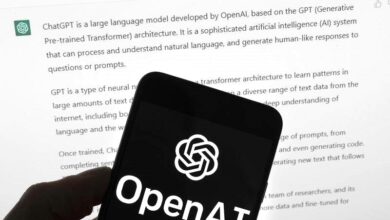Artificial Intelligence and Global Governance: Shaping the Future Together
AI's Global Impact: Navigating the Future Together

Global Governance: Artificial Intelligence (AI) has emerged as a transformative force in the modern world, impacting various sectors and aspects of human life. Its rapid evolution raises profound questions about global governance, as it has the potential to reshape economies, societies, and even international relations. In this article, we will explore the role of AI in global governance, its challenges, and the imperative for international cooperation in navigating this technological frontier.

The AI Revolution
The AI revolution is characterized by the development of intelligent systems capable of performing tasks that traditionally require human intelligence. Machine learning algorithms, neural networks, and big data have fueled AI’s growth, enabling breakthroughs in fields such as healthcare, finance, transportation, and more. AI’s potential is immense, offering solutions to complex problems and enhancing efficiency across industries.
Challenges Posed by AI
While AI presents countless opportunities, it also brings significant challenges. These include:
Ethical Dilemmas:
AI can be used for both good and evil. Ethical concerns arise regarding issues like bias in AI algorithms, privacy infringements, and the potential for autonomous weapons.
Job Displacement:
Automation and AI have the potential to displace human workers, leading to economic and social disruptions.
Security Risks:
Malicious use of AI, such as cyberattacks and deepfake technology, poses security threats.
Global Economic Shifts:
AI may lead to shifts in economic power, with countries that dominate AI technology gaining significant advantages.
The Role of Global Governance
To address these challenges, global governance mechanisms must be established or strengthened. Here are several key aspects to consider:
International Agreements:
Nations should collaborate to develop international agreements governing the responsible use of AI, setting ethical standards and norms for its application.
Regulation and Oversight:
Regulatory bodies must be established to monitor and ensure compliance with AI standards, protecting human rights and privacy.
Ethical Frameworks:
A global ethical framework for AI should be established, guiding the development and use of AI technologies.
Data Sharing and Collaboration:
Countries should promote data sharing and international research collaboration to accelerate AI advancements while ensuring transparency and fairness.
Multilateral Organizations
Existing multilateral organizations can play a crucial role in AI governance:
United Nations:
The UN can serve as a platform for global discussions on AI governance, hosting dialogues among member states and facilitating cooperation.
World Trade Organization (WTO):
The WTO can address trade-related aspects of AI, ensuring a level playing field for countries in the AI race.
World Health Organization (WHO):
The WHO can oversee AI applications in healthcare, ensuring equitable access and ethical use.
International Telecommunication Union (ITU):
The ITU can address AI’s impact on telecommunications and internet governance.
National and Regional Initiatives
In addition to global efforts, nations and regions should take proactive steps:
National AI Strategies:
Countries should develop national AI strategies that encompass research, development, and ethical guidelines.
Regional Collaboration:
Regional organizations can foster cooperation among neighboring countries in AI research and regulation.
Capacity Building:
Investment in AI education and workforce development is essential for nations to harness AI’s benefits.

Conclusion
Artificial Intelligence is a transformative force that demands global governance. The challenges posed by AI are not confined by national borders, requiring collective solutions. To harness the potential of AI for the betterment of humanity, nations must work together, develop ethical frameworks, and establish robust governance mechanisms. In doing so, we can shape a future where AI serves as a tool for progress, rather than a source of division and disruption. The path to responsible AI governance is a global endeavor, and it is our responsibility to walk it together.
FAQs:
What is the relationship between Artificial Intelligence (AI) and global governance?
AI and global governance are interconnected because AI technologies have the potential to reshape economies, societies, and international relations, necessitating governance mechanisms to address their challenges and opportunities.
What are the main challenges posed by AI in the context of global governance?
Challenges include ethical dilemmas, job displacement, security risks, and potential shifts in economic power, among others.
How can global governance address the ethical concerns related to AI?
Global governance can establish international agreements and ethical frameworks to guide the responsible development and use of AI technologies, ensuring they align with human rights and values.
What role can international organizations like the United Nations play in AI governance?
International organizations can serve as platforms for discussions, facilitate cooperation among member states, and provide guidelines for ethical AI development.
Are there specific areas where AI governance is particularly important?
Yes, areas such as AI in healthcare, cybersecurity, and trade-related aspects of AI are particularly important and require focused governance efforts.
How can individual countries contribute to AI governance efforts?
Countries can develop national AI strategies, invest in AI education and workforce development, and collaborate with neighboring nations on regional AI governance initiatives.
What is the role of AI in global economic shifts, and how can this be managed through governance?
AI can lead to shifts in economic power due to technological advantages. Governance can ensure a level playing field in AI-related trade and economic activities.
What measures can be taken to ensure data privacy in the era of AI and global governance?
Robust regulatory bodies and international agreements can help establish data privacy standards and ensure compliance across borders.
How can global governance encourage responsible AI research and development?
By promoting transparency, ethical guidelines, and collaboration, global governance can encourage the responsible advancement of AI technologies.
What is the ultimate goal of AI and global governance efforts?
– The ultimate goal is to harness the potential of AI for the betterment of humanity while addressing its challenges in a collaborative and responsible manner, shaping a future where AI benefits all.




